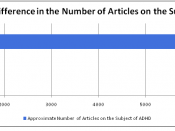There are many mental disorders that plague the United States. Many of these disorders share common symptoms, because of this they can be very easily misdiagnosed at first sight. However, perhaps the most misdiagnosed, and over diagnosed disorder is Attention Deficit Disorder (ADD), and the very closely related Attention Deficit Hyperactivity Disorder (ADHD) (Haber).
Dictionary.com has defined ADD/ADHD as "A syndrome, usually diagnosed in childhood, characterized by a persistent pattern of impulsiveness, a short attention span, and often hyperactivity, and interfering especially with academic, occupational, and social performance." It is estimated that approximately 2 million or three to five percent of all children within the United States are troubled by this disorder, making it one of the most common mental disorders faced by Americans. Not only does this disorder affect children but in most cases the disorder follows the child into adulthood (Jaksa). ADD/ADHD can be classified into three main groups: Predominantly Hyperactive-Impulsive, Predominantly Inattentive, and the Combined type.
The predominantly hyperactive-impulsive type is characterized by someone who is always "on the go," always talking, playing with anything in sight, can't sit still, doesn't think before they speak, doesn't think about consequences of their actions, even blurting out or randomly moving around, which can often be confused with tourette syndrome, all of these symptoms and more can be adherent with the hyperactive-impulsive type. The predominantly inattentive type incorporates symptoms like; becoming easily bored, easily distracted by noises and random sights, not finishing tasks before moving to a different task, and being very forgetful ("Attention Deficit Hyperactivity). For obvious reasons the combined type is the most detrimental of the three main types of ADD/ADHD.
Scientists at this time still are not completely sure about what causes ADD/ADHD. One possible theory for ADD/ADHD revolves around brain. It is thought that the...


